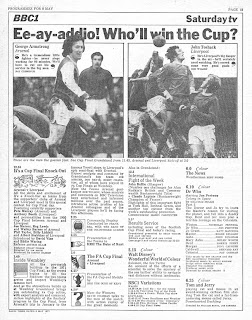FA Cup Final day was always a special day for TV football fans in
the 1970s for a number of reasons. For example:
-It was the last day of the domestic football season. All league
issues, promotion, relegation, were settled. (The only exception would be if a
club had a European final afterwards). The game was a way for all of us to say goodbye to the season.
-It was a rare case of a game which was televised live – indeed the only live
club game of the season.
-Playing at Wembley was a special treat for most players, and
attending was a special treat for all fans. I remember my own excitement in
1985 going to watch Norwich in the League Cup Final.
-And of course the FA Cup is the world’s oldest football
competition – a straight forward one-off knock out competition – lose and you are out – the only team that does not lose is the winners.
Television would help make the day very special. With only three
channels, and two of them dominated to the day from mid-day through to after
5pm, it was a rough afternoon if you were not a football fan.
Coverage of the day would be a usual pattern – we would talk to
the players at their hotels, have a further chat on their respective buses,
another chin wag as they wander on the pitch in their new suits, specially
designed for the occasion – there would be ‘The Road to Wembley’ features where
we saw the highlights of the previous rounds (those games which had been televised
of course) – and a usual panel of experts giving their thoughts, along with
some celebrity guests such as Eric Morecambe and Elton John.
There will be specials of Football Focus and On The Ball, and Saint
and Greavsie would each follow a team – I especially remember 1984 when Ian St
John attached himself to the Everton team bravely wearing his red Liverpool shirt,
while Londoner Greavsie would visit ‘our new borough’ in Watford.
ITV would slip in their usual other features – the wrestling, of course,
and the racing – and BBC would feature shows such as ‘It’s A Cup Final Knockout’,
‘Cup Final Mastermind’ and, er, ‘Cup Final Jim’ll Fix it’. And sometimes the Women’s
FA Cup Final would feature.
We’d see the teams come out, all line up to meet the guest of
honour, sing Abide with Me, then kick off with a big cheer. Afterwards it would
be ‘Meet The Winners’ – or not as in the case of 1970 and 1981-2-3. Replays are
now of course something else that has changed.
Then all over by 5.30, time for tea, Doctor Who, and then, just in
case you’ve not had enough of the box, Saturday evening telly – but that is
another story!


